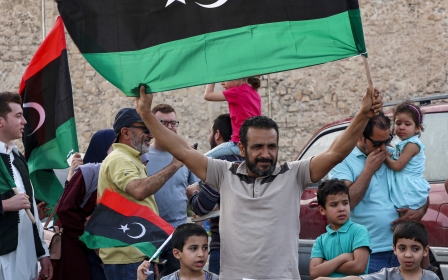Libyans begin using new currency rate after years of division

Libyans on Sunday began using a new unified currency rate aimed at ending discrepancies between the rates used in the country's divided west and east and on the black market.
Libya's central bank held a meeting to agree the rate in December, its first since the institution split in 2014 when the country was divided between rival governments based on either side of the country.
Stay informed with MEE's newsletters
Sign up to get the latest alerts, insights and analysis, starting with Turkey Unpacked
Unifying the exchange rate was reportedly one of the conditions of a ceasefire deal agreed in October.
As part of the change, the internationally recognised Government of National Accord (GNA) in Tripoli suspended a fee on foreign currency transactions that it introduced two years ago to bring the official rate closer to the widely used black market rate.
The Central Bank of Libya board agreed the new rate of 4.8 dinars to the United States dollar during last month's meeting.
In Tripoli, the black market rate on Sunday was 5 dinars to the dollar after dropping last week towards the new official rate.
"We'll have to wait three or four months to see how things go at commercial banks," Amer, a currency dealer, told Reuters.
Black market exchange shops in the east were mostly closed on Sunday waiting for the market to settle.
Malik al-Fakhri, an electronics dealer in Benghazi, said he had stopped using banks after 2013 because he lost too much money importing at the official rate and turned instead to the black market.
"The most important thing for the trader is stability," he said.
The new rate is an effective devaluation, meaning the cost of imported goods are likely to rise.
"This decision is a mistake that will harm citizens more than benefiting them and is only to satisfy traders," said Hathem al-Barghathi, also in Benghazi.
The moves are part of a wider effort to resolve economic obstacles to peacemaking, encourage implementation of previously agreed reforms and hamper opportunities for corruption.
However, while fighting between the GNA and commander Khalifa Haftar's eastern-based Libyan National Army (LNA) mostly stopped in June after the collapse of his assault on government-held Tripoli, diplomatic progress towards a political solution has slowed.
A ceasefire agreed in October in Geneva has been only partly implemented, with troops still occupying frontline positions, a main coastal road still closed and foreign mercenaries remaining in place.
Meanwhile, while the group of Libyans picked by the United Nations to plot a path towards democracy has set elections for the end of this year, they could not agree on a new unified government to oversee the transition period.
Middle East Eye delivers independent and unrivalled coverage and analysis of the Middle East, North Africa and beyond. To learn more about republishing this content and the associated fees, please fill out this form. More about MEE can be found here.





